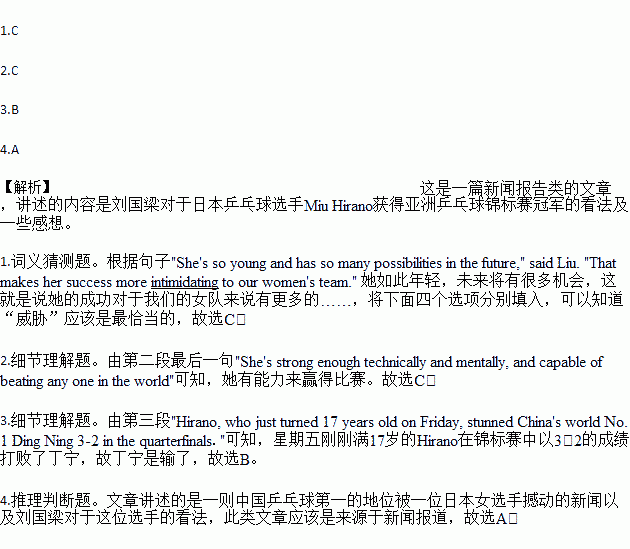题目内容
China’s boss of table tennis Liu Guoliang was shocked at his first sight of Japanese teenager Miu Hirano who beat three top-ranked Chinese to claim a sensational victory of the women’s singles at the Asian Table Tennis Championships.
"She’s much better than I had imagined," said Liu, on the conclusion of the continental tournament(锦标赛). "When she came out the winner of last year's World Cup, I thought maybe she took advantage of the absence of the Chinese women paddlers. However, I changed my mind when I saw her play here. She’s strong enough technically and mentally, and capable of beating any one in the world," added Liu.
Hirano, who just turned 17 years old on Friday, stunned China's world No. 1 Ding Ning 3-2 in the quarterfinals before second-ranked Zhu Yuling 3-0 and finally seeing off world No. 5 Chen Meng, also 3-0, to smash the Chinese dominance(统治)of the tournament.
"She's so young and has so many possibilities in the future," said Liu. "That makes her success more intimidating to our women's team."
In Liu's opinion, the difficulties that China faced in these Asian championships reflected the changes of table tennis world map in recent years.
"It's not just recently that Japan wants to beat China," he said. "By the end of the day, their efforts finally worked out."
The head coach, however, refused to stand all by the Japan's side. "We do need to learn from the other associations, including the Japanese, who do an excellent job on youth training," Liu said. "But one failure should not lead to the whole denial to our own team. I think it's a good thing to have competitors who can pose real challenges, which makes our sport more competitive and more healthy," he added.
1.What’s the meaning of the underlined word “intimidating” in paragraph 4?
A. possible B. certain
C. threatening D. impossible
2.Why could Miu Hirano win the last year’s World Cup?
A. Because Miu made use of the absence of the Chinese women paddlers.
B. Because Chinese women paddlers were weak.
C. Because Miu was capable of winning the game.
D. Because Liu Gouliang wanted her to win the game.
3.Which statement is NOT true according to the passage?
A. Zhu Yuling is the second-ranked in the world of table—tennis.
B. Miu Hirano was defeated by Ding Ning in the quarterfinals of the Asia Table Tennis Championships.
C. China’s female paddlers face the great challenge.
D. Female table-tennis world map has changed in recent years.
4.The passage most likely comes from______.
A. a news report B. a fashion magazine
C. a biography D. a science fiction

